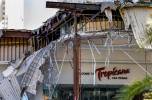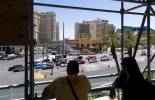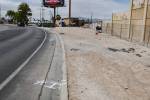Closed circuit TV, stronger police presence among Strip proposals
First Amendment restrictions, a closed circuit television system and a stronger police presence on the Strip are among dozens of recommendations from a work group studying resort corridor issues that will be discussed Tuesday by the County Commission.
Out of that discussion will come a three-month pedestrian study to examine how foot traffic fluctuates on the world-famous four-mile stretch of road to identify "trouble spots" or areas where movement is congested.
County officials will rely on law enforcement observations and the forthcoming pedestrian study to help determine where some First Amendment time, place and manner restrictions could be enforced in high-volume foot traffic areas.
The Resort Corridor Workgroup, established last year by commissioners and assembled by County Manager Don Burnette, met secretly over several months to hammer out the details of proposed Strip improvements to "prevent further degrading of the brand," according to county management notes.
The group is composed of high-level gaming industry and tourist executives and law enforcement representatives from the Las Vegas Convention and Visitors Authority, Caesars Entertainment, Wynn Las Vegas, Boyd Gaming and the Metropolitan Police Department, among others.
DETERRING CRIME
Police Capt. Todd Fasulo, whose Convention Center Area Command includes the Strip, said cameras would help identify illegal gamblers and vendors selling tap water in used bottles who prey on tourists.
"This is not big brother," Fasulo said. "This helps manage resources from a bird's-eye view, and it's a crime deterrent. These are not secret cameras in places where the public couldn't see them."
He said 180 officers -- 40 plain-clothed -- police the Strip and its thousands of visitors.
"We need more cops on the street," Fasulo said. "How we get there and how we fund that is a whole different story. Visible presence is a deterrent."
The discussion includes resort properties pooling funds to pay for extra police and other resources, as they did last summer during a rash of stabbings on the Strip. It's unclear how much was spent on additional resources or how many extra officers were on hand.
County Commissioner Steve Sisolak shared an anonymous letter with the Review-Journal from a tourist who frequented the Strip for years but "will not be returning anymore" because of panhandling, prostitution, graffiti and "filthy walkways."
"Funding is something we'll have to look at," Sisolak said. "You need a police presence, but those things all take money."
Sisolak helped prompt the discussion about the Strip's brand degradation when he walked down the street, and "it was just not good."
"It was not, in my opinion, a pleasurable experience," he said.
OTHER RECOMMENDATIONS
A suggested night court also is included to handle certain offenses on the Strip and expedite these cases. The idea would be modeled after the Philadelphia Municipal Court's Nuisance Night Court program, which works at night and on the weekends.
The group's proposal calls for prohibiting standing or stopping on walkways and bridges on the Strip, forcing handbillers to clean up their messes, and halting all commercial activity in the public right of way.
When it comes to pedestrian safety, the proposal suggests an ordinance to restrict activities on the public sidewalk that could pose a potential safety risk to pedestrians, including the use of unicycles, bicycles, skateboards, roller skates and shopping carts, and "the launching or throwing of projectiles and other objects into the air."
"It's not like we have a list of ordinances in our back pocket targeting hula hoops or shopping carts, those are examples," Burnette said. "We need to spend some more time talking to Metro to get a better sense of the things they're dealing with."
The work group recently weighed in on the "pet curfew" ordinance that bans animals on pedestrian bridges and sidewalks from noon to 5 a.m. each day. The law exempts certain animals on Las Vegas Boulevard from Sahara Avenue to Sunset Road about 200 yards on each side of the Strip during this time.
Critics slammed that ordinance in its infancy stages as unconstitutional because it appeared to target panhandlers and the homeless. Proponents said the change addresses animal cruelty complaints filed by tourists.
Contact reporter Kristi Jourdan at kjourdan@reviewjournal.com or 702-455-4519.
Resort corridor recommendations























